Vattanac Golf Resort's East Course has been honored as the Best Golf Course in Cambodia for 2024 by the World Golf Awards.
Things to do in Da Nang
Attracting much reverence throughout the country and internationally, the city of Da Nang was once a bit of a backwater in the grand scheme of Vietnam. Up until a change in policy by Emperor Minh Mang in 1835, Da Nang had very little to boast, and after the French occupied the city, it had even less. Much of Da Nang was developed by the French over the course of their six decades in charge, and the city changed once more during the American War, when it became an important base for American and South Vietnamese troops. After being quite considerably through the mill, Da Nang emerged as Vietnam’s third-largest city, and now features one of the strongest marriages of nature, architecture and religion in the country.
Amongst many of the best things to do in Da Nang, there runs a theme of jaw-dropping nature, viewable from many of its internationally renowned sites such as the Marble Mountains, Son Tra, the Hai Van Pass and My Khe Beach. The city’s iconic Dragon Bridge has emerged not only as a symbol of the city, but one of the country as a whole, heralding a modern look to a city with ancient roots and a troublesome recent past. Many Vietnam tours rightly feature Da Nang in their itinerary, despite it being sandwiched between the two bigger attractions of Hue and Hoi An. With a view to ensuring Da Nang is not overlooked, we present our guide on the top things to do in Da Nang.
Marble Mountains
The Marble Mountains almost look like they have been dropped from above rather than risen from below, such is their unusual appearance amongst the flat land between Da Nang and Hoi An. The five outcrops are spread out from each other, but are connected by an elemental theme, as each one is named for an ancient force intrinsic to Buddhism: metal, water, wood, fire and earth. Once a great source of natural marble for the villages that hug their foothills, chipping away at the holy mountains is now forbidden as they are now an important religious and touristic site.
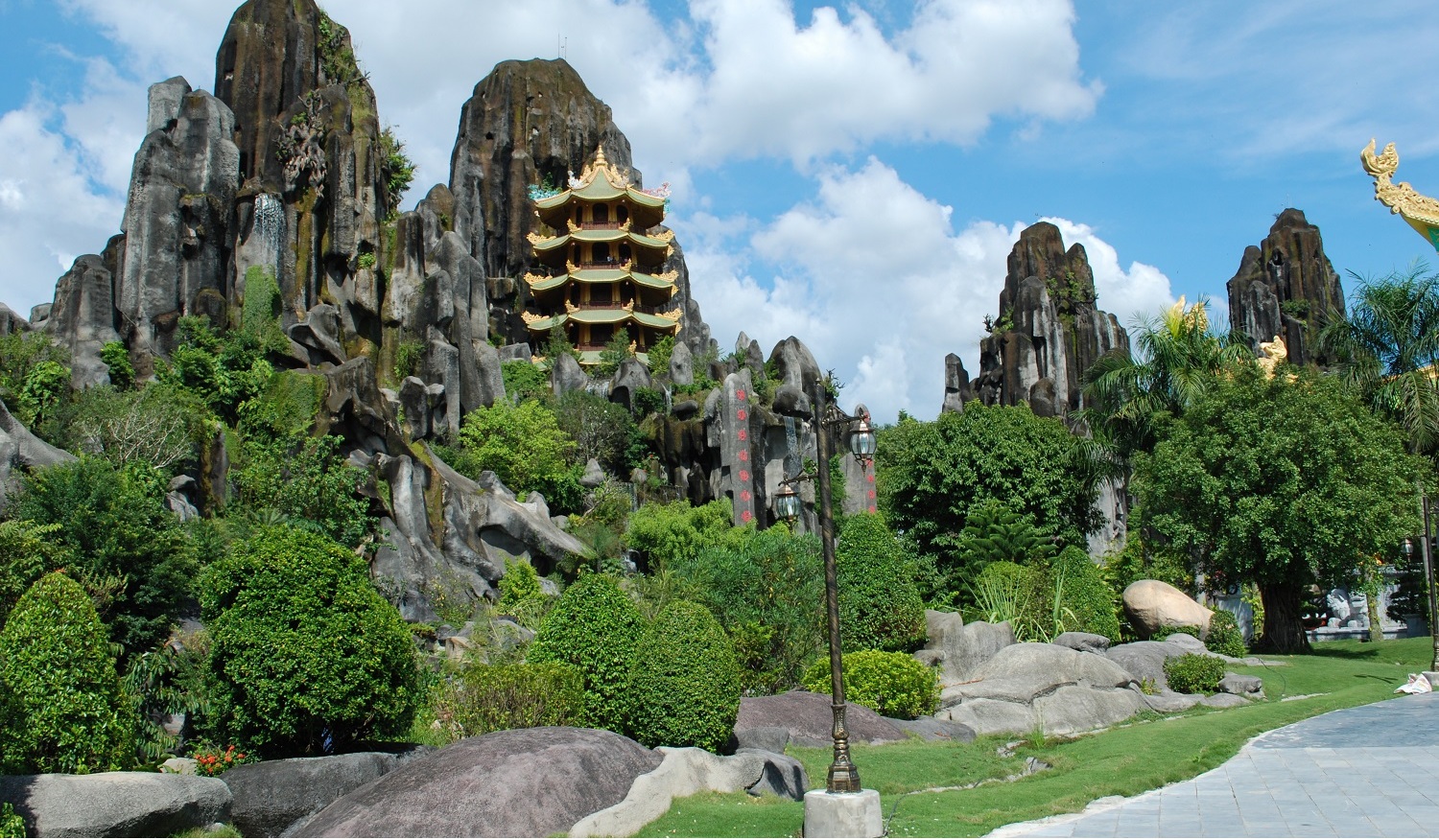
Thuy Son (The Water Mountain) is the most prominent mountain, with many religious buildings and viewpoints around its craggy surface making it one of the top things to do in Da Nang. The Water Mountain is an overland time capsule, with many pagodas dating back to around 400 years ago, and many more being built throughout the intervening years. The series of steps and paths that winds around the mountain also dips inside at points, into caves like Huyen Khong, a stunning cavern where natural light filters from above, illuminating the Trang Nghiem Tu Temple and the streaked marble walls that rise up around it.
Just outside, you will find the Tam Thai Pagoda; for photographers, probably one of the best things to see in Da Nang. The appeal of the instagram-friendly façade is created through colourful lanterns, extravagant roofing, a green sea of potted plants and the wisps of incense that snake up from the front of its white walls. Continue climbing for a great panoramic view of the area, including the other four mountains and the otherwise flat plateau between Da Nang and Hoi An.
Snake Around the Son Tra Peninsula
Because one (or five) mountains is never enough, Da Nang features another huge one just at the northern tip of its city, stretching out ambitiously into the ocean. This bloomed outcrop sits atop a thin stem of land connecting it to the city, and bursts into life on the weekends as the locals come to enjoy one of Danang’s top attractions. If life feels relaxed and simple in the city, try experiencing a daytrip from Da Nang to the Son Tra Peninsula, where stunning views from the ocean road and a gorgeous sunset will provide you with one of Vietnam’s unmissable experiences.
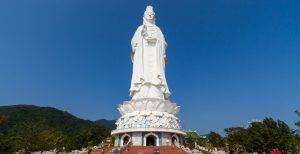
The 639m-tall mountain won’t win any awards for height, but its wide base gives it an imposing figure and the perfect conditions for construction. This is why on any Vietnam group tour that visits Son Tra, you will find winding ocean roads and the Linh Ung Pagoda, a beautiful and modern temple dedicated to the Lady Buddha as the 67m-tall statue of her looks out to sea. The views atop the temple complex are magical, as you can see Da Nang’s ocean, curved coastline, urban sprawl and mountainous background all in one scene.
The forested face of Son Tra gives it an attractive and distinctly Vietnamese look. You can follow the snaking mountain roads between the trees via car or motorbike, looking out for the many monkeys who live here, along with deer, who are much rarer.
Get Educational with Cham Sculptures
‘Cham sculptures’ may be a term unfamiliar with most, but during the 9th century in particular, the region encompassing Da Nang, Hoi An and many areas north and south of what is now Central Vietnam was full of examples of grand Cham monuments. The Cham people were the subjects of the Cham Kingdom, an impressive civilisation between the 2nd and 15th centuries, eventually brought to an end from constant warring with the Vietnamese and Khmer. The Cham fled throughout Southeast Asia and experts nowadays have gone to great efforts to preserve their most impressive feats.
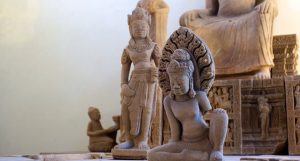
One of the great preservers of Cham culture is the Museum of Cham Sculpture in Da Nang, where visitors can find the biggest collection of Cham sculptures in the world, devoted mainly to Hinduism but also featuring sculptures of the Buddhist and Islamic religions to which some of the Cham people converted. This central Da Nang attraction was built in 1915, therefore marrying ancient Cham artistry with colonial French architecture, as France was in full control of the city at the time. The museum’s expansion in 1936 has allowed the additions of some large, ornate and fantastically well-preserved sculptures, and now an entrance fee of just 40,000 VND ($1.90) can grant you access into one of the most interesting things to do in Da Nang.
The crowning achievement of the Cham civilisation lies nearby, just west of Hoi An. My Son Sanctuary is often referred to as ‘Vietnam’s Angkor Wat’ for its weather-and-war-eroded temples, which sit amongst a jungle environment that creates a beautifully eerie atmosphere around the complex. Daytrips from Da Nang to My Son Sanctuary are certainly possible, though they are much more common from Hoi An.
Relax on My Khe Beach
For a beach so close to a city to be in pristine condition is a highly commendable feat, particularly when this beach is located in a country not particularly known for its environmental concerns. My Khe Beach is often graced with two vast blue seas; one being the concave bay leading out to the East Vietnam Sea, and one being the deep blue sky that lies above. Running the entire length of Da Nang, My Khe offers relaxation through its white sands dotted with swaying palm trees, with a view of Da Nang’s impressive architecture on one side and the sights of beautiful nature across the bay and up to the Son Tra Mountain.

One of the best experiences in Da Nang starts from My Khe, and it starts very early in the morning. The entirety of the beach faces east, meaning sunrises are completely uninhibited and can be viewed from anywhere along the length of My Khe. Join the morning exercises here with the locals, or wait until later in the day to relax on the sands, swim, or join students for a game of da cau – foot badminton.
Tour the Four Bridges over the Han River
All credit to the Vietnamese, who could have constructed a few drab bridges over the Han River to connect the two halves of the city, but instead decided to create four architectural masterpieces that gave the city many landmarks and helped to put it on the map of Vietnam. Of the four, the indisputable king is Cau Rong, the Dragon Bridge, featuring on virtually every postcard sent from Da Nang. The long, rippling body of the golden dragon that runs up the middle of the bridge is an awe-inspiring sight, even more so when the dragon lights up and breathes fire and water every weekend evening.
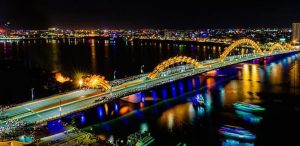
You can’t cross the bridge while the dragon is spouting its fury (surprising, considering Vietnam’s less-than-whole commitment to health and safety), but taking a trip along its length during the day is certainly one of the best things to do in Da Nang. It affords fantastic views of both sides of the Han River, as well as the other bridges that are certainly worth a look as well. Cau Song Han (the Han River Bridge), Cau Tran Thi Ly and Cau Thuan Phuoc are the other bridges spanning the wide-river, and taking a motorbike across their lengths is one of the essential Vietnam experiences.
Cruise the Hai Van Pass
The four hours in between Da Nang and the imperial city of Hue can either be extremely boring or extremely beautiful, depending on which route you take. While public buses plough through the efficient, but lacklustre Hai Van Tunnel, passengers on Vietnam tour packages and independent travellers opt for the longer, but much more thrilling Hai Van Pass, regularly voted amongst the best mountain roads in the world.
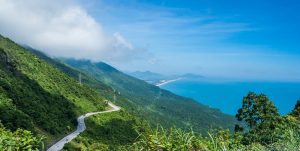
This 21km road winds along the northern reaches of Da Nang, around its forested mountain and sets visitors on their way towards Hue, with a perennial gorgeous backdrop of soaring mountains and the carpet of blue across the ocean. Along the way, drivers can make stops at viewpoints, waterfalls and beaches, following in the footpaths of Jeremy Clarkson, Richard Hammond and James May, who televised their crossing of the Hai Van Pass in 2008 for the BBC’s Top Gear.
Source: incredibleasiajourneys.com


